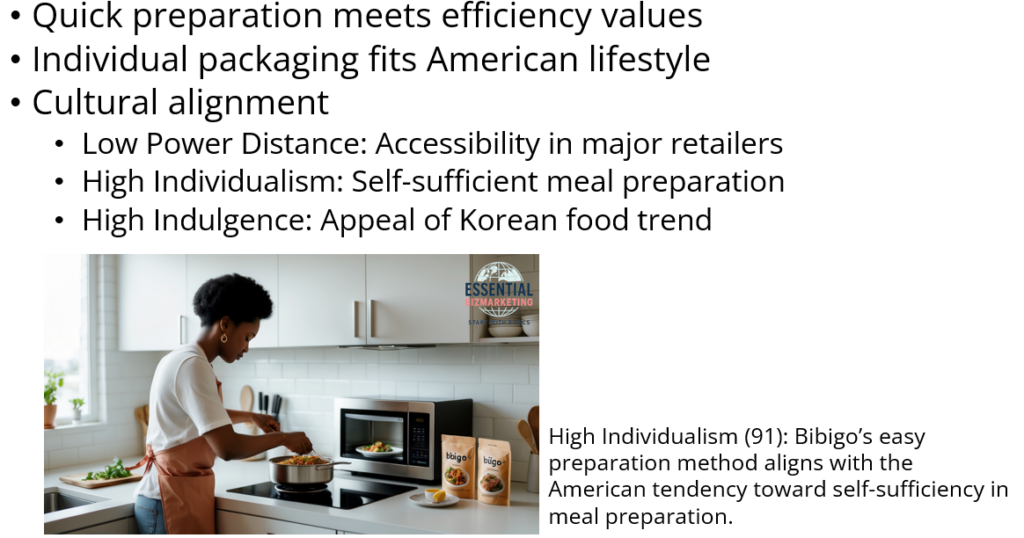
Beyond simply adapting flavors and marketing strategies to local tastes, Bibigo dumplings naturally align with key cultural values in different markets. This cultural fit strengthens the product’s appeal and makes it more than just an international food item—it integrates seamlessly into local consumer behaviors and preferences.
United States: Efficiency, Convenience, and Individualism
In the United States, efficiency and time-saving are highly valued cultural attributes. Americans often seek quick, convenient meals that do not compromise on quality or taste. Bibigo dumplings cater to this need by being easy to prepare in multiple ways—steamed, air-fried, or microwaved—offering a gourmet-style meal in just a few minutes. Additionally, the dumplings are packaged in a way that suits individual consumption or small households, fitting the individualistic culture of the U.S., where people often eat alone or prepare single-serving meals.
From a Hofstede cultural dimension perspective:
- Low Power Distance (40): American consumers expect convenience, accessibility, and high autonomy in their food choices. Bibigo’s availability in major grocery chains, club stores like Costco, and online platforms supports this.
- High Individualism (91): Bibigo’s easy preparation method aligns with the American tendency toward self-sufficiency in meal preparation.
- High Indulgence (68): The trend of enjoying diverse and exciting flavors, including Korean food as an exotic, trendy option, supports the appeal of Bibigo dumplings.
China: Collectivism, Tradition, and Family-Oriented Eating
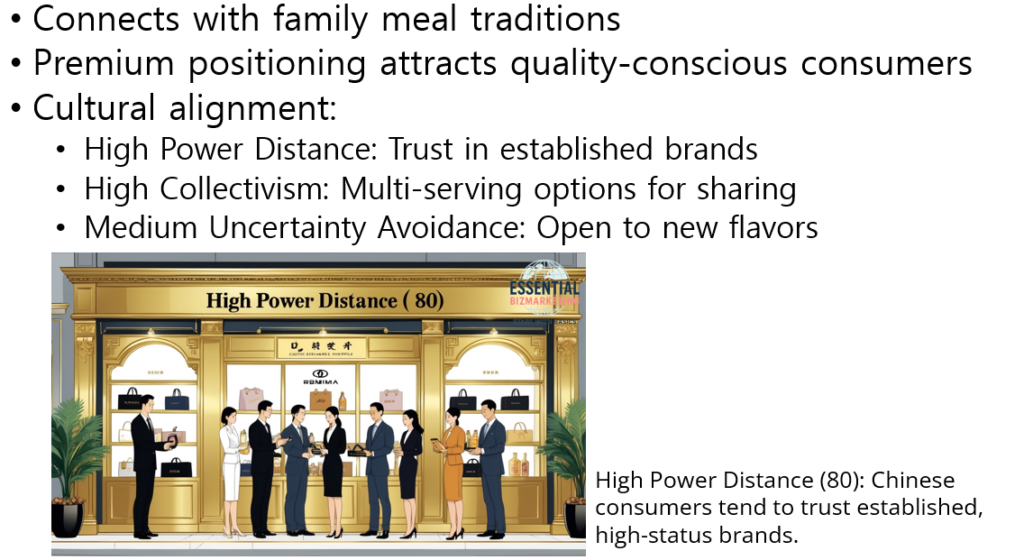
In China, dumplings are deeply embedded in cultural traditions, often associated with family meals and special occasions such as Chinese New Year. While Bibigo dumplings differ from traditional Chinese dumplings by having a thinner wrapper and different fillings, they still align with the local cultural norm of sharing food with family. Additionally, as Chinese consumers increasingly embrace premium and international food brands, Bibigo’s positioning as a high-quality, globally recognized product has helped it gain traction.
From a Hofstede cultural dimension perspective:
- High Power Distance (80): Chinese consumers tend to trust established, high-status brands. Bibigo’s premium branding and association with Korean food culture reinforce its credibility.
- High Collectivism (20): Food is often shared among family and friends, making larger portions or bulk-buy options popular. Bibigo’s product packaging aligns with this by offering multi-serving options.
- Medium Uncertainty Avoidance (30): The Chinese market is open to experimenting with new flavors, making Bibigo’s Korean-style dumplings an exciting alternative to traditional options.
Japan: Quality, Aesthetics, and Precision
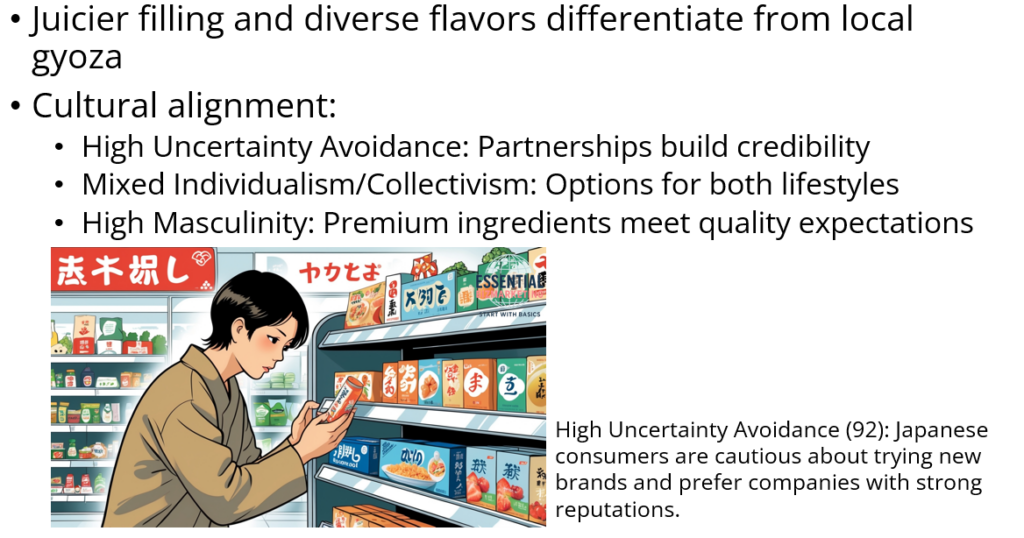
Japanese consumers prioritize high-quality ingredients, refined flavors, and aesthetically pleasing food presentations. The Japanese dumpling (gyoza) market is already well-developed, with Ajinomoto’s gyoza dominating. However, Bibigo differentiates itself by offering Korean-style dumplings with a juicier filling and diverse flavor profiles, catering to Japanese consumers who are interested in global cuisine but still expect a high level of precision in food texture and balance.
From a Hofstede cultural dimension perspective:
- High Uncertainty Avoidance (92): Japanese consumers are cautious about trying new brands and prefer companies with strong reputations. Bibigo’s expansion through OEM partnerships and retail collaborations ensures credibility before directly competing with local brands.
- Moderate Individualism (46) & Collectivism: While family meals are important, many Japanese consumers also eat alone, especially in urban settings. Bibigo’s single-serve frozen dumpling packs cater to this lifestyle.
- High Masculinity (95): Japanese consumers tend to value high performance and excellence in products, making premium-quality ingredients and product differentiation a necessity in this market.
Germany and France: Health-Conscious Eating and Gourmet Quality
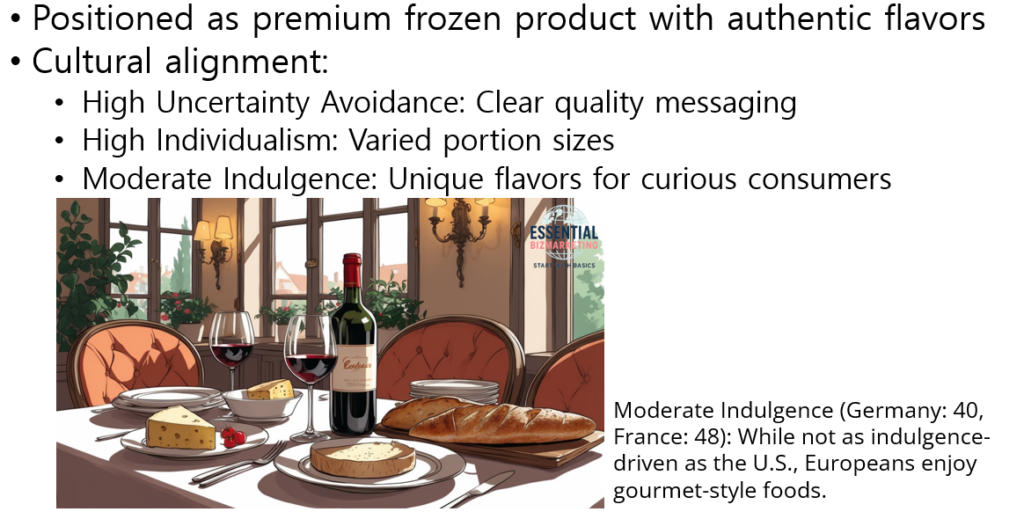
In Germany and France, food culture revolves around health consciousness, high-quality ingredients, and an appreciation for artisanal craftsmanship. European consumers often prefer fresh over frozen food, so Bibigo has positioned itself as a premium frozen product that does not compromise on quality. Its dumplings are marketed as an authentic yet modern take on Asian cuisine, aligning with the growing interest in gourmet frozen meals.
From a Hofstede cultural dimension perspective:
- High Uncertainty Avoidance (Germany: 65, France: 86): European consumers prefer well-established brands with clear quality guarantees. Bibigo’s emphasis on authenticity and premium ingredients meets this expectation.
- High Individualism (Germany: 67, France: 71): Like in the U.S., single-serving meal solutions are popular. Bibigo’s varied portion sizes appeal to both individuals and families.
- Moderate Indulgence (Germany: 40, France: 48): While not as indulgence-driven as the U.S., Europeans enjoy gourmet-style foods. Bibigo’s unique flavors, such as kimchi dumplings, align with the curiosity for diverse cuisines.
Southeast Asia: Familiarity with Dumpling-Style Cuisine
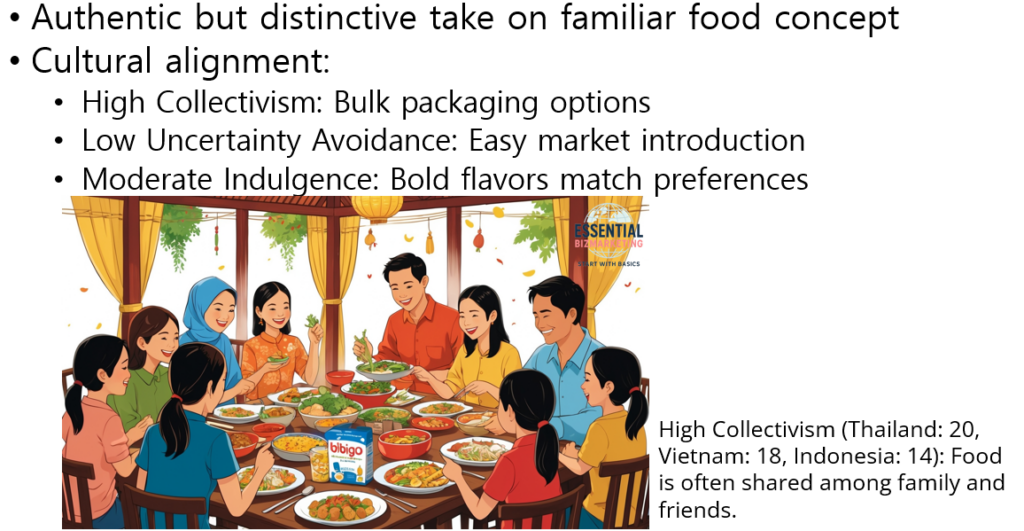
In Southeast Asia, dumplings and similar foods—such as dim sum in Thailand, Indonesia, and Vietnam—are widely consumed. Bibigo fits well within the region’s food culture as an authentic but slightly different take on traditional dumplings. Additionally, Southeast Asian consumers are accustomed to bold flavors, making Bibigo’s Korean-inspired taste profile appealing.
From a Hofstede cultural dimension perspective:
- High Collectivism (Thailand: 20, Vietnam: 18, Indonesia: 14): Food is often shared among family and friends. Bibigo’s bulk packaging options cater to this communal dining culture.
- Low Uncertainty Avoidance (Thailand: 34, Indonesia: 48): Southeast Asian consumers enjoy trying new food products, making Bibigo’s introduction into these markets relatively smooth.
- Moderate Indulgence (Thailand: 45, Indonesia: 38): Consumers in these regions enjoy exciting, flavorful foods, which align with Bibigo’s bold flavor profiles.
Predicted Consumer Behaviors Based on Hofstede’s Cultural Dimensions
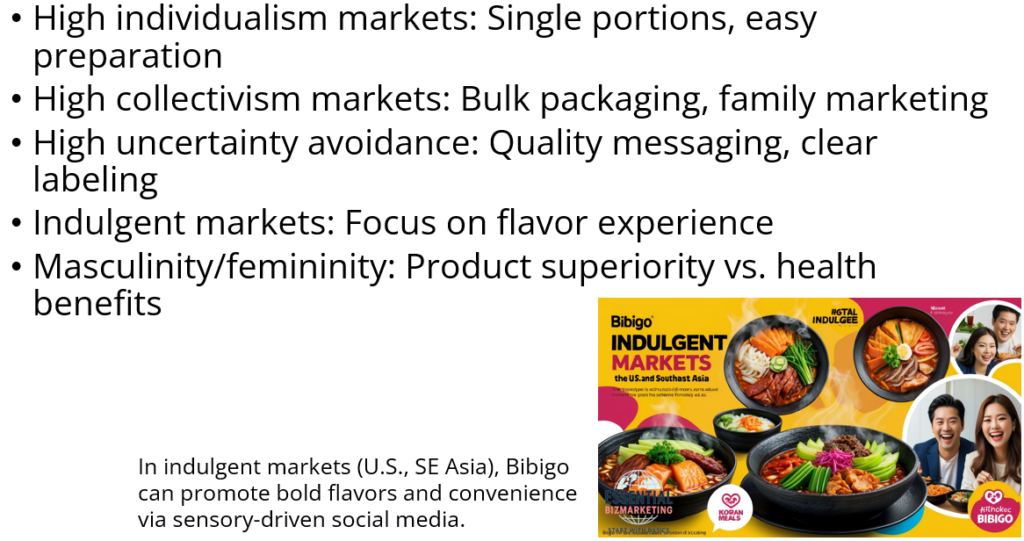
- In high individualism markets (U.S., Germany, France, Japan), Bibigo’s frozen dumplings will likely be consumed in single portions for individual meals, making smaller packaging and easy preparation methods essential.
- In high collectivism markets (China, Southeast Asia), Bibigo will be purchased more for group settings, family meals, or social gatherings, making bulk packaging and family-friendly marketing strategies more effective.
- In high uncertainty avoidance markets (Japan, Germany, France), trust in the brand, product quality, and clear labeling of ingredients are crucial, requiring strong brand messaging about health, safety, and authenticity.
- In indulgent markets (U.S., Southeast Asia), Bibigo can focus on promoting its exciting flavors and convenience, leveraging social media campaigns that highlight the sensory appeal and enjoyment of Korean food.
- In cultures with high masculinity (Japan, China, Germany), branding should emphasize product superiority, premium quality, and bold flavors, while in more feminine cultures (Scandinavia, Netherlands), messaging around health benefits and sustainability may be more effective.
Conclusion
Bibigo dumplings align naturally with different cultural values across markets, making them not just a Korean export but a globally adaptable product. Their appeal stems from their convenience, high-quality ingredients, and the increasing appreciation for Korean cuisine worldwide. Understanding Hofstede’s cultural dimensions allows Bibigo to predict consumer behaviors, tailor marketing strategies, and optimize product offerings for continued success in the global market.
📚 References
Hofstede Framework and Cultural Dimensions. https://geerthofstede.com/culture-geert-hofstede-gert-jan-hofstede/6d-model-of-national-culture/
The Culture Factor. https://www.theculturefactor.com/country-comparison-tool
📁 Start exploring the Blog
📘 Or learn more About this site
🧵 Or follow along on X (Twitter)
🔎 Looking for sharp perspectives on global trade and markets?
I recommend @GONOGO_Korea as a resource I trust and regularly learn from.
